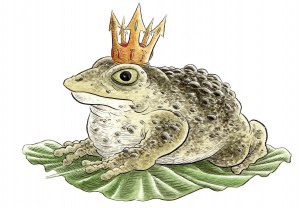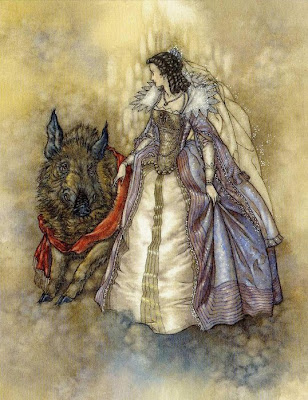As an aside, the Folio Society released a heart-breakingly exquisite edition of the Red Fairy Book. Check it out.
ONCE upon a time there lived a King who had three daughters. Now it happened that he had to go out to battle, so he called his daughters and said to them:
`My dear children, I am obliged to go to the wars. The enemy is approaching us with a large army. It is a great grief to me to leave you all. During my absence take care of yourselves and be good girls; behave well and look after everything in the house. You may walk in the garden, and you may go into all the rooms in the palace, except the room at the back in the right-hand corner; into that you must not enter, for harm would befall you.’
`You may keep your mind easy, father,’ they replied. `We have never been disobedient to you. Go in peace, and may heaven give you a glorious victory!’
When everything was ready for his departure, the King gave them the keys of all the rooms and reminded them once more of what he had said. His daughters kissed his hands with tears in their eyes, and wished him prosperity, and he gave the eldest the keys.
Now when the girls found themselves alone they felt so sad and dull that they did not know what to do. So, to pass the time, they decided to work for part of the day, to read for part of the day, and to enjoy themselves in the garden for part of the day. As long as they did this all went well with them. But this happy state of things did not last long. Every day they grew more and more curious, and you will see what the end of that was.
`Sisters,’ said the eldest Princess, `all day long we sew, spin, and read. We have been several days quite alone, and there is no corner of the garden that we have not explored. We have been in all the rooms of our father’s palace, and have admired the rich and beautiful furniture: why should not we go into the room that our father forbad us to enter?’
Sister,’ said the youngest, `I cannot think how you can tempt us to break our father’s command. When he told us not to go into that room he must have known what he was saying, and have had a good reason for saying it.’
`Surely the sky won’t fall about our heads if we DO go in,’ said the second Princess. `Dragons and such like monsters that would devour us will not be hidden in the room. And how will our father ever find out that we have gone in?’
While they were speaking thus, encouraging each other, they had reached the room; the eldest fitted the key into the lock, and snap! the door stood open.
The three girls entered, and what do you think they saw?
The room was quite empty, and without any ornament, but in the middle stood a large table, with a gorgeous cloth, and on it lay a big open book.
Now the Princesses were curious to know what was written in the book, especially the eldest, and this is what she read:
`The eldest daughter of this King will marry a prince from the East.’
Then the second girl stepped forward, and turning over the page she read:
`The second daughter of this King will marry a prince from the West.’
The girls were delighted, and laughed and teased each other.
But the youngest Princess did not want to go near the table or to open the book. Her elder sisters however left her no peace, and will she, nill she, they dragged her up to the table, and in fear and trembling she turned over the page and read:
`The youngest daughter of this King will be married to a pig from the North.’
Now if a thunderbolt had fallen upon her from heaven it would not have frightened her more.
She almost died of misery, and if her sisters had not held her up, she would have sunk to the ground and cut her head open.
When she came out of the fainting fit into which she had fallen in her terror, her sisters tried to comfort her, saying:
`How can you believe such nonsense? When did it ever happen that a king’s daughter married a pig?’
`What a baby you are!’ said the other sister; `has not our father enough soldiers to protect you, even if the disgusting creature did come to woo you?’
The youngest Princess would fain have let herself be convinced by her sisters’ words, and have believed what they said, but her heart was heavy. Her thoughts kept turning to the book, in which stood written that great happiness waited her sisters, but that a fate was in store for her such as had never before been known in the world.
Besides, the thought weighed on her heart that she had been guilty of disobeying her father. She began to get quite ill, and in a few days she was so changed that it was difficult to recognise her; formerly she had been rosy and merry, now she was pale and nothing gave her any pleasure. She gave up playing with her sisters in the garden, ceased to gather flowers to put in her hair, and never sang when they sat together at their spinning and sewing.
In the meantime the King won a great victory, and having completely defeated and driven off the enemy, he hurried home to his daughters, to whom his thoughts had constantly turned. Everyone went out to meet him with cymbals and fifes and drums, and there was great rejoicing over his victorious return. The King’s first act on reaching home was to thank Heaven for the victory he had gained over the enemies who had risen against him. He then entered his palace, and the three Princesses stepped forward to meet him. His joy was great when he saw that they were all well, for the youngest did her best not to appear sad.
In spite of this, however, it was not long before the King noticed that his third daughter was getting very thin and sad-looking. And all of a sudden he felt as if a hot iron were entering his soul, for it flashed through his mind that she had disobeyed his word. He felt sure he was right; but to be quite certain he called his daughters to him, questioned them, and ordered them to speak the truth. They confessed everything, but took good care not to say which had led the other two into temptation.
The King was so distressed when he heard it that he was almost overcome by grief. But he took heart and tried to comfort his daughters, who looked frightened to death. He saw that what had happened had happened, and that a thousand words would not alter matters by a hair’s-breadth.
Well, these events had almost been forgotten when one fine day a prince from the East appeared at the Court and asked the King for the hand of his eldest daughter. The King gladly gave his consent. A great wedding banquet was prepared, and after three days of feasting the happy pair were accompanied to the frontier with much ceremony and rejoicing.
After some time the same thing befell the second daughter, who was wooed and won by a prince from the West.
Now when the young Princess saw that everything fell out exactly as had been written in the book, she grew very sad. She refused to eat, and would not put on her fine clothes nor go out walking, and declared that she would rather die than become a laughing-stock to the world. But the King would not allow her to do anything so wrong, and he comforted her in all possible ways.
So the time passed, till lo and behold! one fine day an enormous pig from the North walked into the palace, and going straight up to the King said, `Hail! oh King. May your life be as prosperous and bright as sunrise on a clear day!’
`I am glad to see you well, friend,’ answered the King, `but what wind has brought you hither?’
`I come a-wooing,’ replied the Pig.








 While failure
While failure 